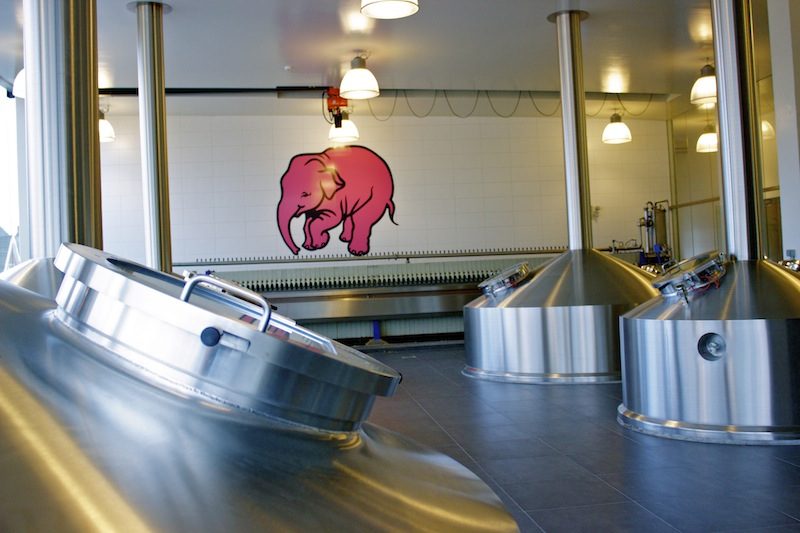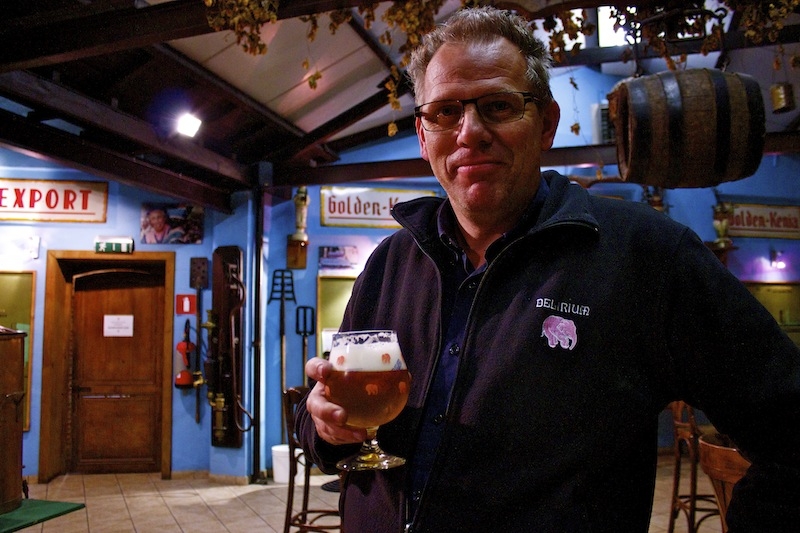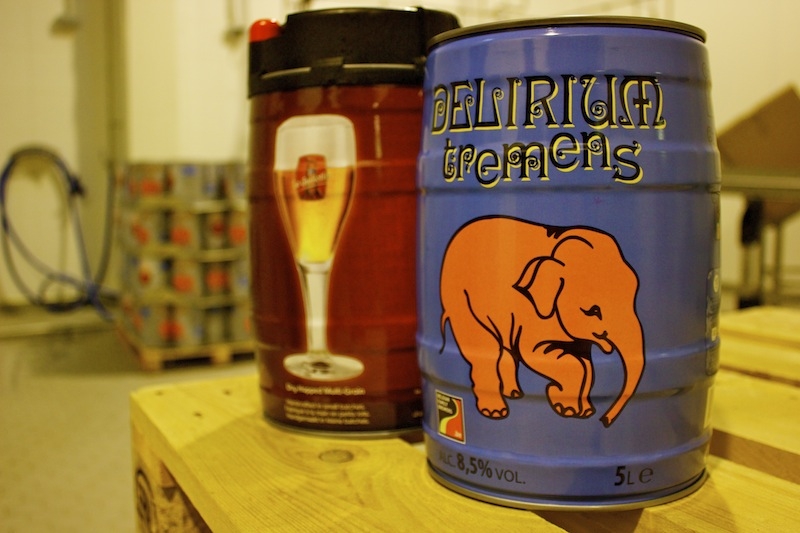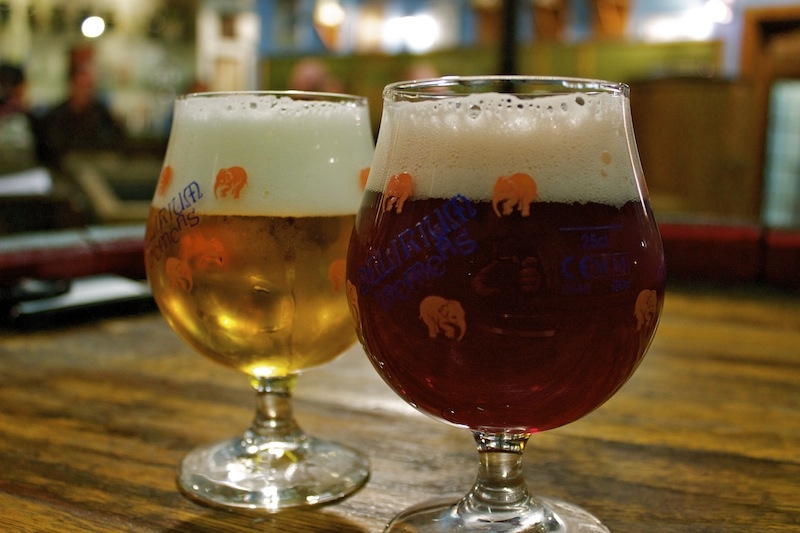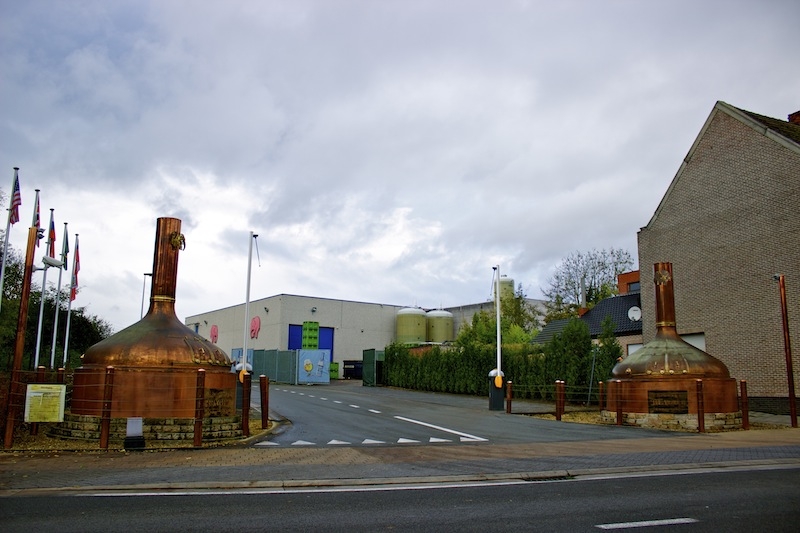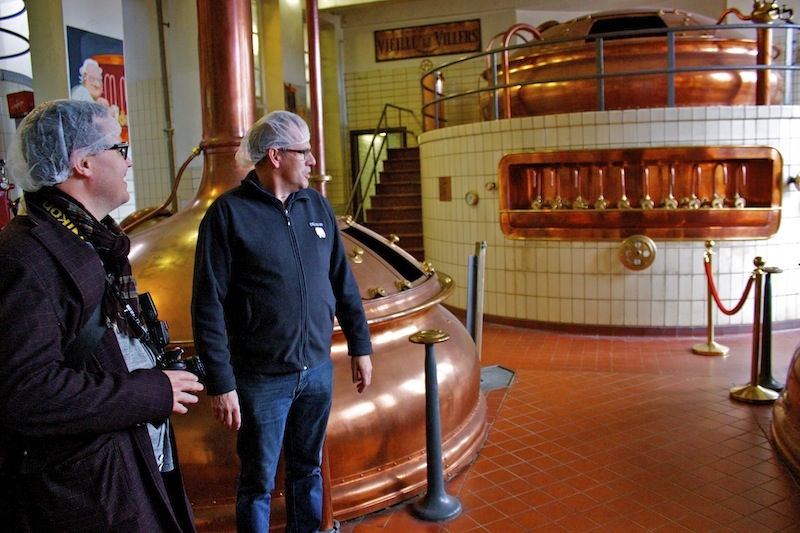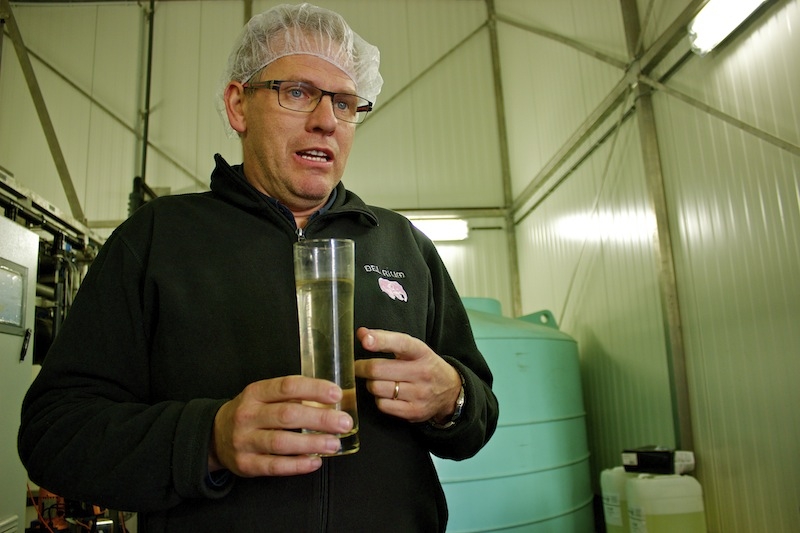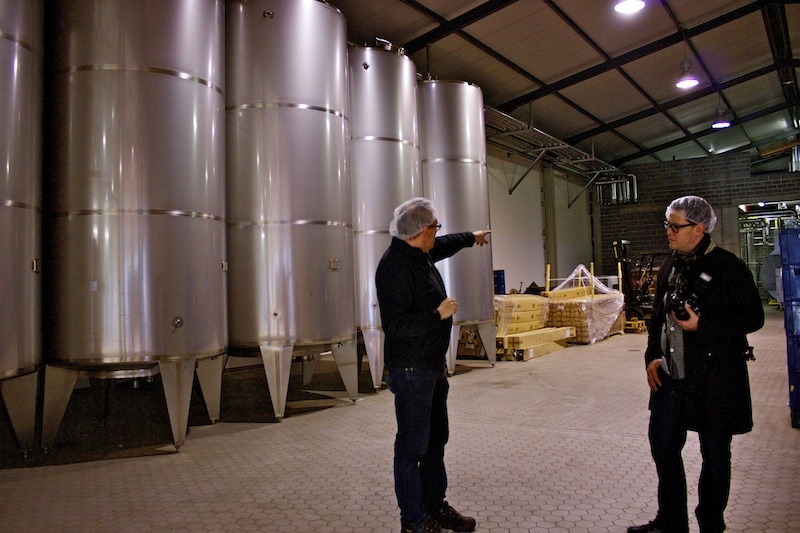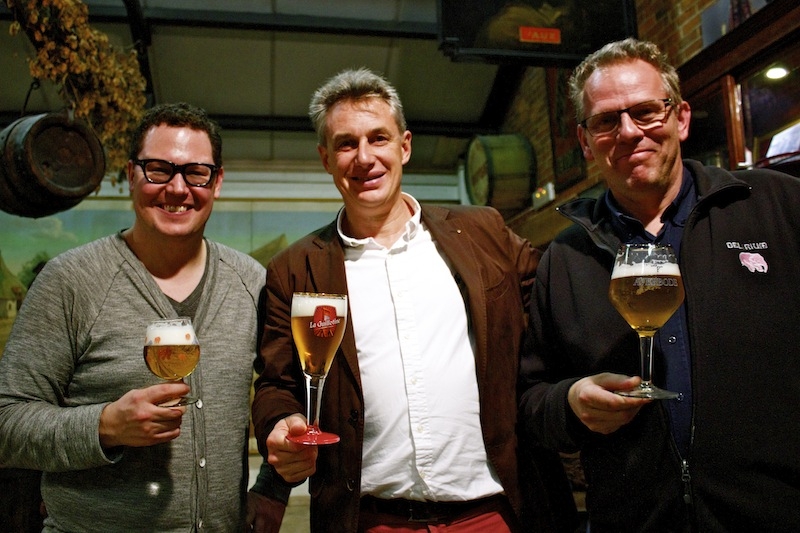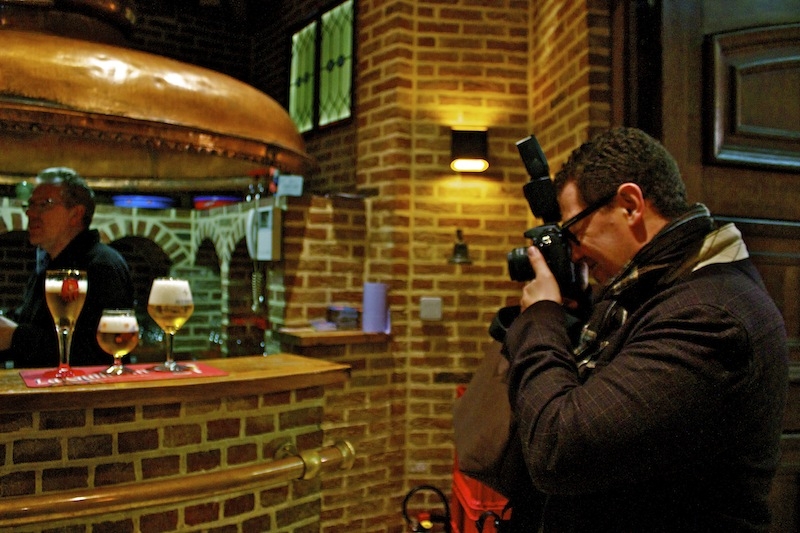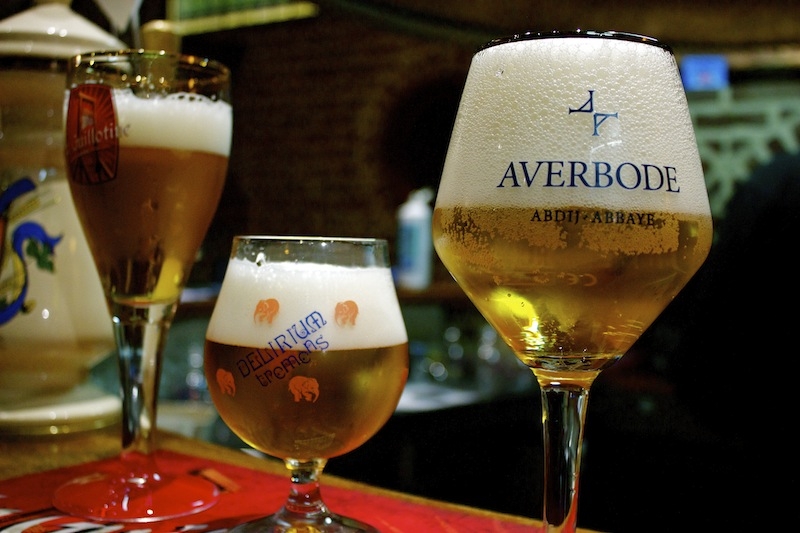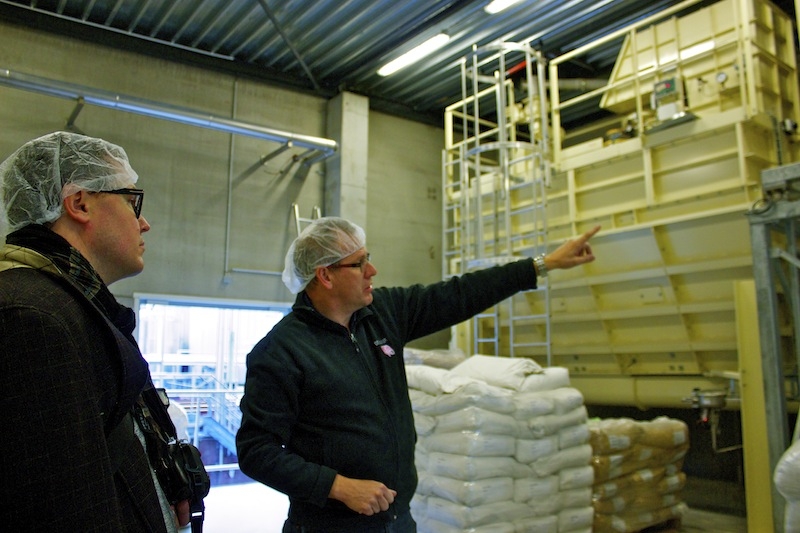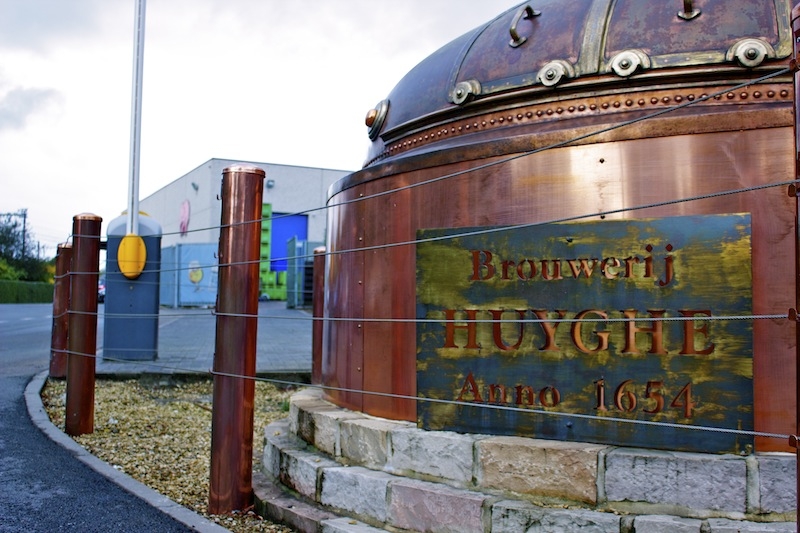Jumbo Jr. is a semi-anthromorphic elephant ridiculed for his big ears in the 1941 animated film ‘Dumbo’.
There’s a famous scene in the movie in which Jumbo Jr. becomes drunk and begins hallucinating, seeing a troupe of pink elephants perform a strange and terrifying sequence of absurd dances.
Chris Barnes brings it up. He’s a beer aficionado and beer writer based in Portland, Oregon whose online home is ‘I think about beer’ and we are on a tour of the Huyghe brewery in Melle with our guide, Filip Devolder, the brewery’s purchase manager.
Chris’ Disney movie reference is appropriate because we are surrounded by pink elephants here at this large brewery located 14kms from Ghent.
DELIRIUM TREMENS: THE TREMBLING MADNESS
The pink elephant is everywhere because it can be found on the logo of the brewery’s best selling beer, and in a way, it has become a symbol of the brewery’s success.
There is even a statue just outside the brewery which depicts a man holding a globe, atop of which stands a pink elephant, commissioned to remind those within the walls of the brewery that “the man who owns the pink elephant holds the world in his hands.”
The beer in question is Delirium Tremens, a Latin term which refers to an acute episode of violent sickness amid confusion and fear caused by withdrawal from alcohol after a heavy drinking spree. It manifests itself in a shaking frenzy.
The ‘DTs’ first came to my attention in Ireland through the voice of folk singer Christy Moore whose song of the same name poetically recounts the tale of a man experiencing these horrors: “I dreamt a dream the other night I couldn’t sleep a wink; The rats were tryin’ to count the sheep and I was off the drink; There were footsteps in the parlour and voices on the stairs; I was climbin’ up the walls and movin’ round the chairs.”
Nasty stuff. Delirium Tremens is a serious and horrible illness and the name of the beer has been surrounded with no small measure of controversy. Upon its release in the late 1980s, certain cases had to be removed from shelves in foreign markets and to this day there are difficulties with permissions in certain countries.
However, there is nothing in this beer which promotes unhealthy drinking and rather than a cheap and insensitive marketing ploy, the pink elephant is an eccentric reference to the creative madness of Belgian brewing. The brewery is mindful of such criticism and has offered to change the label and the name of the beer to ‘Delirium’ in certain places.
The packaging of the beer might pass as medicinal if it wasn’t so wildly iconic, a ceramic bottle with glimmering blue foil around its neck as well as on its shiny cap.
Where it gets really interesting and more than a little baffling is the label, where in a Dantesque collage, strutting alligators and purple dragons on shining spheres are surrounded on each corner by the bewildering but now iconic Huyghe pink elephant, all topped off by a line of flying golden birds.
It’s a representation of the different stages of Delirium and when I ask Filip who created the label, he tells me that it was designed by a student working at the brewery on a summer job. That’s a nice one to have on your CV.
HOW THE BEER HAS DEFINED THE BREWERY
As a consequence of intelligent international distribution channels and its unique branding and sheer quality of production, Delirium Tremens has become the flagship beer of Huyghe brewery.
It has only been brewed since 1989, but it makes up a substantial proportion of the output of the brewery. It has claimed numerous awards around the world, the most notable of which came in 2008 when it was named the ‘Best Beer in the World’ for that year at the World Beer Championships in Chicago, Illinois, USA.
It’s a Belgian strong ale of 8.5% ABV and owes its magic to a wonderful peppery spice and citric fruit character deriving from the three different strains of yeast used in its fermentation, including a strain of yeast unique to the brewery.
THE GREENEST BREWERY IN BELGIUM?
We learn a lot as we move through the brewery, past the unusual cartoon representations of previous owners in the old mash room to the brand spanking new conditioning tanks and busy bottling hall. One key takeaway is that the brewery is clearly doing everything in its power to decrease its energy use and to improve its sustainability.
Chris suggests that it might just be the ‘greenest’ brewery he’s ever visited in Belgium and he engages in an interesting conversation with Filip about some of the similar things that have been happening in America in recent years, particularly at the hands of brewer Ken Grossman of Sierra Nevada.
Huyghe have seriously taken the concept of sustainability to heart. Their newly constructed brew house has enabled them to make huge savings in raw materials, electricity usage and water consumption.
Almost everything we saw being used in the brewing process is being recycled back into the system to the extent that their energy usage has been more than halved between 2008 and 2014. The brewery is already generating around 10% of the energy it needs from solar power and they are hoping to double that figure by 2020. Their annual financial savings from these impressive developments are considerable.
We finish our tour in the old-worldly tasting room (with its ancient beer adverts, old barrels and vintage jugs) and over a Delirium Tremens, we meet brewery owner, Alain De Laet. He continues to talk to us about the importance of working towards a ‘greener’ brewery, stressing that he wants to make a real change to the way they do things and not one for the sake of marketing or box-ticking.
It strikes me from our conversation that sustainability is as much about people to Huyghe as it is about systems. 48 people are employed in the brewery (27 in production) and many live in the local area of Melle.
The night before our tour, members of the local community attended a meeting at the brewery with Alain to voice their concerns over new developments and to discuss together how the brewery could best minimise their environmental impact. These types of initiatives show Huyghe are going about things for the long term.
THE HUYGHE RANGE
While Delirium Tremens is no doubt their most popular beer, they brew a huge range at Huyghe.
Before the pink elephant came along in the 1980s, the brewery was producing around 13,000 hectolitres. Last year that figure was 165,000 hectolitres, over 70% of which was being exported to more than 60 countries worldwide.
Among their range is La Guillotine, a beer of 8.5% ABV which was initially produced to mark the 200th anniversary of the French Revolution, but which has undergone a successful makeover in branding and recipe since its launch.
Their Floris range made them the first brewery in Belgium to brew fruit beers which were based not on lambic, but on wheat beers. They also have a signature Wit brand which goes by the name of Blanche des Neiges.
In the early 1990s they took over both the Campus Brewery and Idesbald monastic breweries and they continue to produce their beers to this day. More recently, they have released a much acclaimed second Abbey Beer which takes its name from the ‘Averbode Monastery’, an abbey where Alain plans to set up a small brewery for special brews in the future.
They have also developed a series of beers in cooperation with Mongozo African Breweries. These include a banana beer modeled on a traditional beer of the Masai tribe in Kenya and Tanzania which is certified with the seal of the ‘Max Havelaar Foundation’. These fair-trade initiatives within the brewery are set to continue as they prepare to launch a ‘Bolivar’ range with OXFAM, top fermented beers with 50% of the ingredients (such as quinoa, rice and sugar cane) being sourced from fair-trade.
THE ORDER OF THE PINK ELEPHANT
If you think that the hats we wore as a safety measure on our tour of the brewery were funny, you should see those worn by the members of the Order of the Pink Elephant.
Jumbo Jr. would be proud.
This is a brotherhood founded in April 1992 which currently boasts 23 active members who are charged with promoting the ancient traditions and local beers of the area. They regularly organise charitable activities and donate the proceeds of their fundraising to the Child Psychiatry ward of Caritas in Melle. Essentially, they’re gastronomic and folkloristic patrons of the Delirium Tremens beer.
The famous Beer Hunter, Michael Jackson, was counted among their members and with his usual dry wit, he wrote about his strange induction:
I was beckoned to the sternest of the robed men, asked to drink the beer down in one and to pledge my support to it above all others. Delirium Tremens is a sippin’ beer, and I am a taster, not a chugger, so I made a poor job of that. Nor could I pledge to promote one beer above all others (my turn to mumble). I was nonetheless “knighted”, with a mashing fork, and a ribbon bearing a medallion decorated with a pink elephant was placed round my neck. I have been a Member of the Order of the Pink Elephant for some years now, and apparently not disgraced myself.
DELIRIUM CAFÉ
The brewery also has an international network of bier cafés in Spain, Brazil, Japan, France and Italy, but their most notable venue is the Delirium Café in Brussels, a bar which holds the Guinness World Record for ‘Most varieties of beer commercially available’.
But watch yourself when you’re in there. If you’re not careful, the distinctive Huyghe bottle of Delirium Tremens won’t be the only place you see a strange collection of strutting alligators, purple dragons and pink elephants.
There are 2,004 beers on their menu.
Before you know it, you’ll feel like you’re in a Disney movie.


